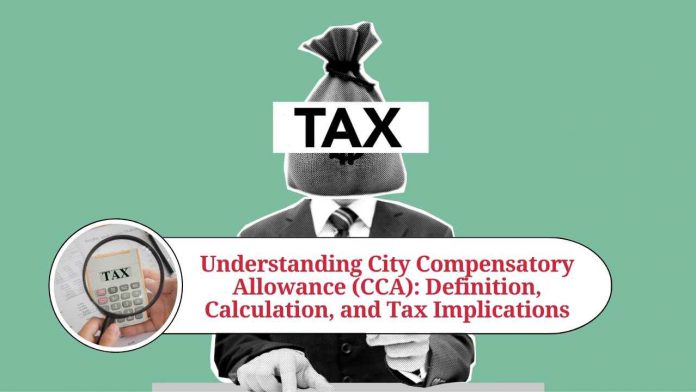City Compensatory Allowance (CCA) is a type of allowance given to employees to compensate for the higher cost of living in cities as compared to smaller towns or rural areas. The purpose of CCA is to help employees maintain their standard of living, which may be affected by the high cost of living in cities. The allowance is usually given as a percentage of the basic salary and varies depending on the city and the organization.
Types of City Compensatory Allowance
There are different types of City Compensatory Allowance based on the city and the organization. Some of the common types of CCA are:
- CCA for Metropolitan Cities: This type of CCA is given to employees working in metropolitan cities like Mumbai, Delhi, Kolkata, Chennai, and Bengaluru. The allowance is usually higher as compared to other types of CCA.
- CCA for Non-Metropolitan Cities: This type of CCA is given to employees working in non-metropolitan cities like Ahmedabad, Pune, Hyderabad, and Jaipur. The allowance is usually lower than CCA for metropolitan cities.
- CCA for Remote Locations: This type of CCA is given to employees working in remote locations like hilly areas, islands, and places with difficult terrain. The allowance is usually higher to compensate for the high cost of living and the challenges of living in such areas.
Benefits of City Compensatory Allowance
- Helps employees maintain their standard of living: CCA helps employees maintain their standard of living by compensating for the high cost of living in cities.
- Attracts and retains talent: Organizations that offer CCA are more likely to attract and retain talent as employees are more likely to stay with an organization that offers better compensation and benefits.
- Improves employee morale: CCA can improve employee morale as employees feel that the organization cares about their well-being and is willing to compensate them for the challenges of living in a city.
How is City Compensatory Allowance Calculated?
The amount of CCA that an employee receives depends on various factors such as the city in which they work, the organization they work for, their job position, and their salary structure. Generally, CCA is calculated as a percentage of the employee’s basic salary.
For instance, an employee who works in a metropolitan city may receive a CCA of 30% of their basic salary, while an employee working in a non-metropolitan city may receive a CCA of 20% of their basic salary.
However, it’s important to note that the exact percentage of CCA varies from organization to organization and may also depend on the cost of living index of the city.
Tax Implications of City Compensatory Allowance
CCAs are taxable under the Income Tax Act, 1961. It is treated as a part of the employee’s salary and is subject to TDS (Tax Deducted at Source).
The employer is responsible for deducting TDS on CCA as per the applicable tax rates. The employee can claim tax benefits on CCA by including it in their income tax return and paying tax on it accordingly.
It’s also important to note that if an employee receives HRA (House Rent Allowance) in addition to CCA, the employee is entitled to claim exemption on HRA under section 10(13A) of the Income Tax Act, subject to certain conditions.
Conclusion
In conclusion, City Compensatory Allowance is an important component of employee compensation that helps employees maintain their standard of living in cities. The amount of CCA varies from organization to organization and is calculated as a percentage of the employee’s basic salary. CCA is taxable under the Income Tax Act and subject to TDS. Therefore, it’s important for employees to understand the tax implications of CCA and how to claim tax benefits on it.
Read more useful content:
Frequently Asked Questions (FAQs)
What is City Compensatory Allowance (CCA)?
City Compensatory Allowance (CCA) is an allowance provided to employees to compensate for the higher cost of living in cities compared to smaller towns or rural areas.
Who is eligible for CCA?
Employees working in cities where the cost of living is higher than smaller towns or rural areas are eligible for CCA.
How is CCA calculated?
CCA is calculated as a percentage of the employee’s basic salary and varies depending on the city and the organization.
Is CCA taxable?
Yes, CCA is taxable under the Income Tax Act, 1961 and is treated as a part of the employee’s salary.
Can an employee claim tax benefits on CCA?
Yes, an employee can claim tax benefits on CCA by including it in their income tax return and paying tax on it accordingly.
How does CCA differ from HRA?
HRA (House Rent Allowance) is provided to employees to compensate for the rent paid by them while CCA is provided to compensate for the higher cost of living in cities.
Is the percentage of CCA the same for all cities?
No, the percentage of CCA varies based on the city and the organization.
Can CCA be revoked by an organization?
Yes, an organization can revoke CCA if the employee no longer works in a city where the cost of living is higher.
Is CCA mandatory for all organizations?
No, providing CCA is at the discretion of the organization.
Is CCA provided to all employees equally?
No, CCA is provided based on the job position, salary structure, and the city where the employee works.




















